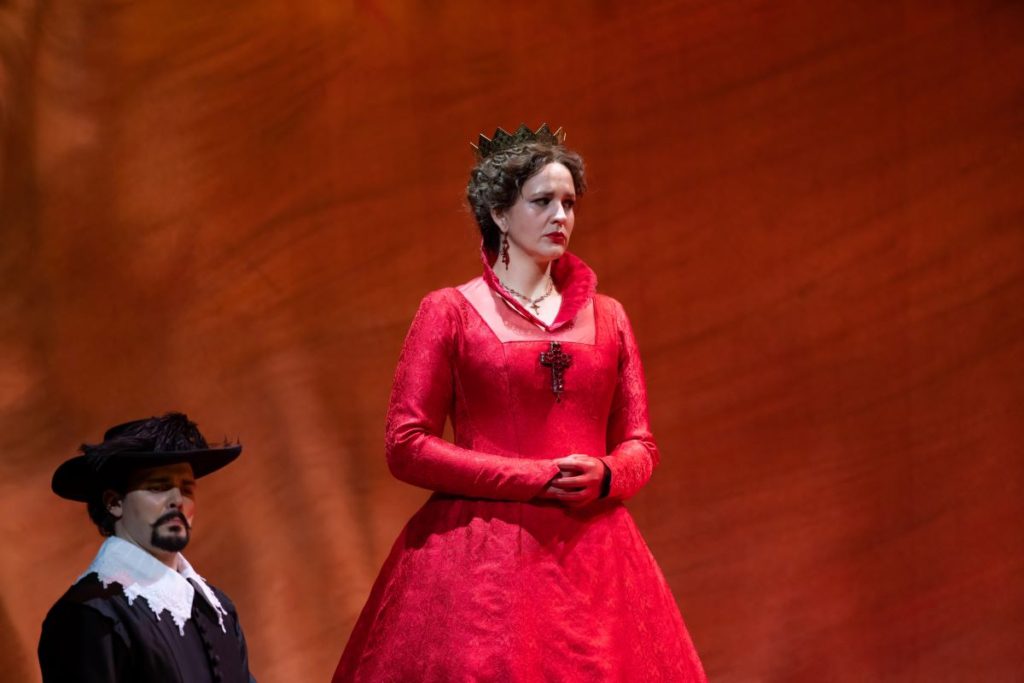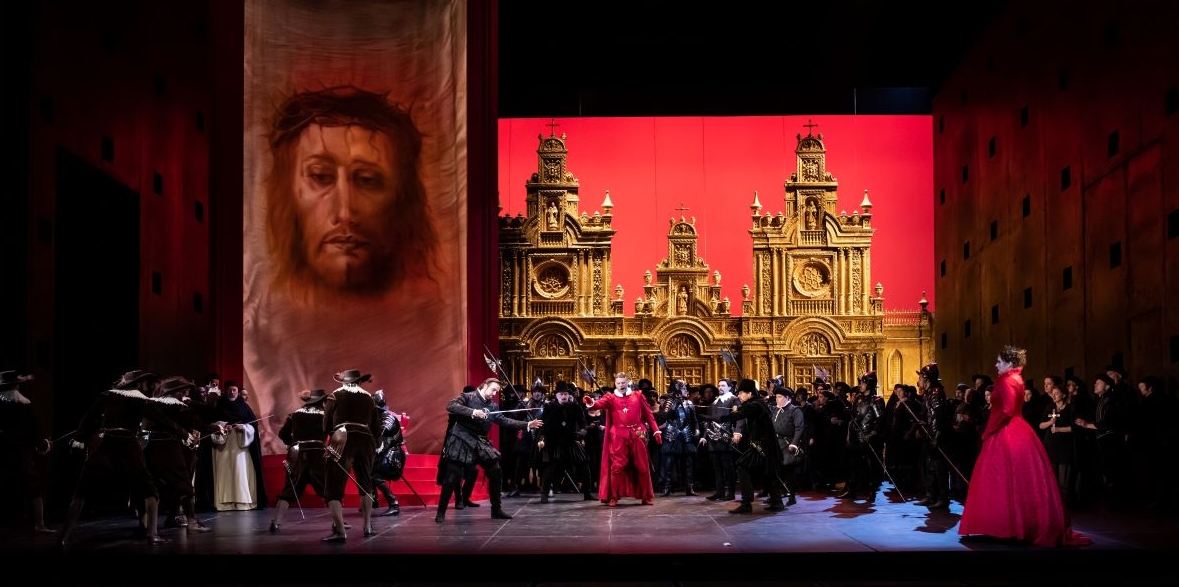Verdi’s Don Carlo is the longest and arguably the greatest Verdi opera, based on Schiller’s play set in Phillip II’s Spain. There are multiple versions, in French and in Italian. The shortest cuts the Fontainebleau scene, without which the ensuing action is barely comprehensible. This is the 1886 Modena version. It is long, but choc-full of superb melodies, solos, ensembles, and excitement.
ROH supporters have had a rum deal recently. The new Il Trovatore was a travesty, little more than a glorified concert performance in costume, but worse as singers such as Tézier were uncomfortably stuck straight-jacketed immobile at the top of the stairs, singing ‘il balen’; those in the mid-back stalls circle couldn’t see anything above the bottom third.
Next was the disappointment of Werther due to Kauffman’s illness and disappointing substitutes (although those on the Floréz night had the best of all performances).
Finally, here is something to relish. Nicholas Hytner is one of our best directors, who understands singers and how producing an opera works. This fourth revival of his 2008 production is still just as powerful. The icy whiteness and freedom of the Fontainebleau scene, where Carlo and Elisabetta fall in love, sharply contrasts with the oppressive blackness of the prisonlike set, allowing light through portcullis-type squares. The only relief from oppressive black is blood-red, the ladies’ fans, the costumes of the King and Queen in the bloody auto-da-fé scene and blood red sky symbolising the burning heretics (their visual crisping now cut). Regimented soldiers and hooded monks add to the stifling atmosphere.
The star is Norwegian soprano Lise Davidsen; this is her hotly awaited Verdi debut. She has, what the Italians call, a ‘vocone’ – a huge voice, which can be heard at the back of the amphitheatre. It is a glorious instrument, which she tapered down as the heady young falling-in-love-with-Carlo princess in Fontainebleau. The ‘vocone’ in all its power is unleashed as the tortured, unhappy Queen, caught in the political dilemma of duty before love. She is a good actress, possessing an astounding vocal palette, variety of shading, tenderness, and ravishing floated fil di voce pianissimi. The demanding Act V aria ‘Tu che la vanità’, summing up Elisabetta’s hollow life of despair, is effortless. Her breath control is superb for the long dramatic legato phrases, Davidsen is outstanding.

Hot on his heels is magnificent Canadian bass John Reylea as Philip. He is just taller than Davidsen’s 6’2”, so dramatically they look right. ‘Ella giammai m’amo’ was generous, gorgeous and velvety with thrilling bottom notes. He has a lovely legato line, and a novel way resonating singing on an ‘n’ – (‘no quel cor chiuso’) Rumanian bass, Ukrainian Taras Shtonda’s Grand Inquisitor pales in comparison. What a shame that Phillip’s arioso in the prison is cut. That music was so good, Verdi reused it in the Requiem’s Lacrymosa. Some of the lengthy final Elisabetta/Carlo duet, musically not adding much, could easily be traded for it. Opportunity lost!
American tenor Brian Jagde has a rich, powerfully penetrating voice as Carlo, possibly needing more subtlety, but good nonetheless. Jagde retains Carlo’s sanity more than other portrayals; considering that the historical Carlo was brain-damaged with physical and speech defects, delicate unhinging works better.
Italian baritone Luca Micheletti, despite good phrasing and breath control, is lightweight for Posa, resembling more a floppy-haired D’Artagnan. He tightens on the rising high phrases; the high note options added for ‘io morro’ are not in Verdi’s score nor right for his voice. And what IS Posa’s undying-love-I-sacrifice-my-life-for-you thing with Carlo, when Carlo loves someone else?
I am confused with the current policy regarding Russian singers. Russian mezzo, Julia Matochkina regularly performs at the Mariinsky/Bolshoi, with Gergiev, publicly sending him warm birthday wishes. As Eboli, (this time without the eye patch from previous productions), the Veil Song revealed a shaky top, dodgy coloratura, and lacked stamina in ‘o don fatale’. So why compromise principles for a controversial artist aligned with Gergiev, when there are many non-Russians who sing Eboli better?
Canadian soprano Sarah Dufrene, a Jette Parker Young Artist, sounds gorgeous as the Voice from Heaven.
Bertrand de Billy brings out the colour palette for orchestra and chorus creating a powerhouse of sound.
Davidsen and Reylea are worth the price of the ticket alone, but also come for the thrilling music and production!

